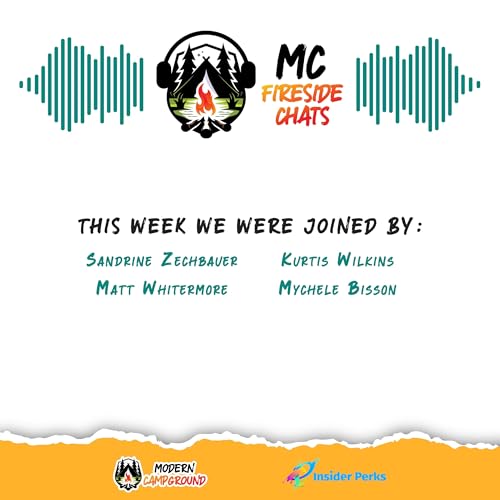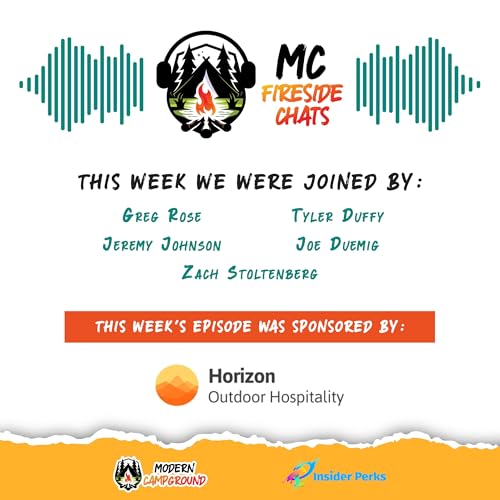The MC Fireside Chats episode on December 3rd, 2025, focused on data, trends, and the future of the outdoor hospitality industry, led by host Brian Searl. The panel included Phil Ingrassia, President of the RV Dealers Association of America (RVDA); Scott Bahr, President of the Cairn Consulting Group; Simon Neal, Founder of CampMap; Miguel Huerta, President of the Mexican Glamping Association; and special guests Deneen Allen, CEO and Founder of Firecircle; and Jen Ballenger, owner of Jim & Mary's RV Park.
Phil Ingrassia opened the discussion by sharing the RVIA wholesale shipment forecast for North America for 2026, noting a cautious optimism based on incremental improvement. He detailed that RV shipments in the US and Canada in 2025 were up about 3% year-over-year, with the 2026 forecast projecting another incremental growth of roughly 2% to 3%. Phil attributed this cautious outlook to lower interest rates, hoped-for tariff stability, and an expected increase in income tax returns in the US, which typically feeds into discretionary spending. Scott Bahr inquired about the impact of higher-income markets, and Phil confirmed that while entry-level travel trailers drive volume, the higher-end fifth wheels are currently performing well, indicating a focus on more profitable mid-to-higher-level units. Deneen Allen asked Phil about Canadian efforts to attract new Canadians to RVing, and Phil discussed studies showing that 60% to 70% of pandemic buyers plan to buy an RV again, indicating strong retention.
Scott Bahr elaborated on new market entrants, noting a movement toward less expensive forms of RVing like boondocking and overlanding, but highlighted the robust and growing sector of using RVs for events, travel sports, and festivals, with the older millennial group being a key driver. Jen Ballenger confirmed this trend, stating that her park in Missoula, Montana, has seen a great job in attracting event-based travel, emphasizing that RVing is perceived as budget traveling compared to dynamic hotel pricing, a point that Jen has observed over her 25 seasons of operation. Deneen Allen then asked the panel if this group trend represented an opportunity for RV parks to focus more on group camping infrastructure.
Miguel Huerta shifted the focus to the global hospitality market, reporting a decline in hotel demand across the US, Mexico, the UK, and Canada in 2025, with Mexico seeing the steepest drop at 12%. For glamping, Miguel noted steep declines in Spain, Mexico, and the UK, but a surprising 20% increase in demand for glamping sites in Canada. Miguel predicted the glamping industry, especially in Mexico, will consolidate, suggesting that sites designed for B2B or group bookings will be the ones to survive. He emphasized the massive revenue opportunity of the upcoming World Cup for RV and glamping operators, which could be monetized by putting low-entry models to work as Airbnbs.
The discussion turned to the complex relationship between pricing and the guest experience. Scott Bahr stressed that pricing is intrinsically part of the perception of the experience, and operators must effectively communicate the value to justify any increase. Deneen Allen supported this, advocating for a focus on delivering value and a "no discounting" philosophy, instead suggesting that operators set a base floor rate and utilize strategic framing or value-adds. Jen Ballenger noted that while she does offer discounts like Good Sam, she sees less complaining about incremental price increases because consumers understand that everything, including power and property taxes, has become more expensive.
In a final rapid-fire Q&A round, Jen Ballenger asked Scott Bahr about data on campers preferring mom-and-pop parks over corporate parks, to which Scott confirmed a large market for authenticity and rustic experiences. Scott Bahr asked Miguel Huerta about the market for rustic camping in Mexico, but Miguel stated the...
 Feb 4 20261 h y 1 m
Feb 4 20261 h y 1 m Jan 28 20261 h
Jan 28 20261 h Jan 21 202655 m
Jan 21 202655 m Jan 14 202659 m
Jan 14 202659 m Jan 7 202659 m
Jan 7 202659 m Dec 17 20251 h y 3 m
Dec 17 20251 h y 3 m Dec 10 202556 m
Dec 10 202556 m Dec 3 20251 h y 6 m
Dec 3 20251 h y 6 m
